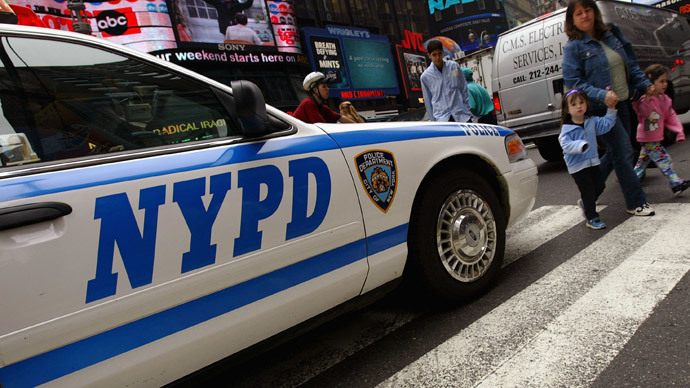Low-level arrests down by 2/3 in NYC after double murder

New York City cops slowed enforcement of low-level-crime laws in the week of Dec. 22 out of safety concerns following the killing of two officers on Dec. 20 and, for some, indignation over a perceived lack of support from the city’s mayor.
Overall arrests for the week of Dec. 22 were down 66 percent compared with the same period in 2013, according to statistics cited by the New York Post.
A drop in policing of low-level crimes was more dramatic. The reduced policing stems, according to sources, from both fear - unions have ordered that two patrol cars must respond to every call - and animosity between New York City Mayor Bill de Blasio and police unions following the fatal shooting of two NYPD officers and the fallout from a grand jury’s decision not to indict a white NYPD officer, Daniel Pantaleo, who was captured on video killing an unarmed black man, Eric Garner, with a chokehold for illegally selling cigarettes in Staten Island.
Citations for traffic infractions in that time frame fell by 94 percent, from 10,069 in 2013 to 587 this year, according to the Post.
Summonses for meagre offenses like public urination or drinking dropped by 94 percent, from 4,831 to 300.
Illegal parking violations went down by 92 percent, from 14,699 to 1,241.
Drug arrests fell by 84 percent, from 382 to 63.
On Dec. 20, the day NYPD officer Rafael Ramos and Wenjian Liu were fatally shot by gunman Ismaaiyl Brinsley in Brooklyn, the Patrolmen’s Benevolent Association, a top police union in the city, purportedly sent out a mass memo telling officers to take safety first and that "Absolutely NO enforcement action in the form of arrests and or summonses is to be taken unless absolutely necessary."
The PBA denied being responsible for the memo but have said since the shooting that Mayor de Blasio had "blood on the hands" for concern he expressed about the grand jury decision and the manner of Garner’s death.
Furthermore, ongoing protests in the city over the grand jury decision - and the mayor’s lack of complete renunciation of the demonstrations over racial profiling and police brutality - have helped embolden NYPD officers to publicly turn their backs on de Blasio at a funeral for Officer Ramos and to boo the mayor at an NYPD graduation ceremony on Tuesday.
“The call last week from the PBA is what started it, but this has been simmering for a long time,” one source told the Post.
“This is not a slowdown for slowdown’s sake. Cops are concerned, after the reaction from City Hall on the Garner case, about de Blasio not backing them.”
NYPD officers’ actions against de Blasio, mainly the public displays of dissatisfaction with the mayor and his tepid, reform-minded approach to the NYPD, led The New York Times editorial board to denounce what it called a “snarling sense of victimhood that seems to be motivating the anti-de Blasio campaign -- the belief that the department is never wrong, that it never needs redirection or reform, only reverence.”
"Mr. de Blasio isn’t going to say it, but somebody has to: With these acts of passive-aggressive contempt and self-pity, many New York police officers, led by their union, are squandering the department’s credibility, defacing its reputation, shredding its hard-earned respect," the board wrote, calling the back-turning "disgraceful acts" that will be "compounded" if it happens at Liu's funeral.
"They have taken the most grave and solemn of civic moments -- a funeral of a fallen colleague -- and hijacked it for their own petty look-at-us gesture."
De Blasio, NYPD Commissioner Bill Bratton, and leaders of New York police unions met on Tuesday to discuss the rift. According to the AP’s sources, union leaders repeated during the meeting their public criticisms of the mayor, saying he was too much in support of protests since the grand jury decision and that he had created an unsafe environment for NYPD officers.
De Blasio, AP reported, insisted during the meeting that he had not been anti-police in his remarks since the non-indictment, adding that he and the police unions had much more common ground as opposed to disagreements.
"There were a number of discussions especially about the safety issues that our members face," said Patrick Lynch, head of the Patrolmen's Benevolent Association, in reading a joint statement from all five New York police unions. "There was no resolve. And our thought here today is that actions speak louder than words and time will tell."












